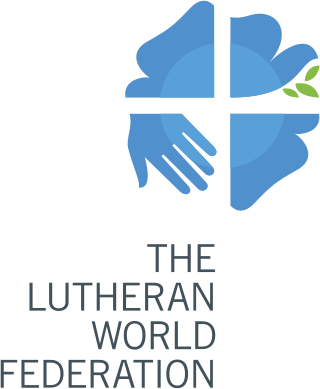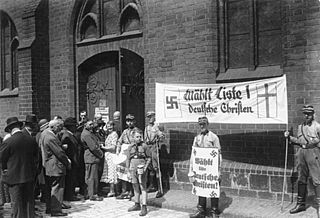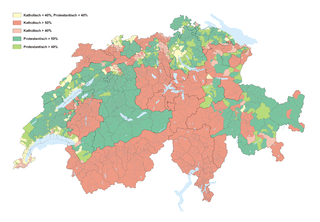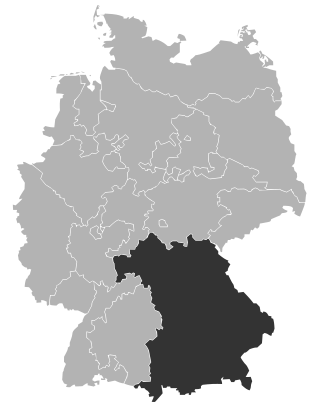
The Council of Trent, held between 1545 and 1563 in Trent, now in northern Italy, was the 19th ecumenical council of the Catholic Church. Prompted by the Protestant Reformation at the time, it has been described as the embodiment of the Counter-Reformation.
The Reformation was a major theological movement in Western Christianity in 16th-century Europe that posed a religious and political challenge to the papacy and the authority of the Catholic Church. Following the start of the Renaissance, the Reformation marked the beginning of Protestantism.

The Huguenots were a religious group of French Protestants who held to the Reformed (Calvinist) tradition of Protestantism. The term, which may be derived from the name of a Swiss political leader, the Genevan burgomaster Besançon Hugues (1491–1532), was in common use by the mid-16th century. Huguenot was frequently used in reference to those of the Reformed Church of France from the time of the Protestant Reformation. By contrast, the Protestant populations of eastern France, in Alsace, Moselle, and Montbéliard, were mainly Lutherans.
The Confessing Church was a movement within German Protestantism during Nazi Germany that arose in opposition to government-sponsored efforts to unify all Protestant churches into a single pro-Nazi German Evangelical Church.

The Protestant Church in Germany, formerly known in English as the Evangelical Church in Germany, is a federation of twenty Lutheran, Reformed, and United Protestant regional Churches in Germany, collectively encompassing the vast majority of the country's Protestants. In 2020, the EKD had a membership of 20,236,000 members, or 24.3% of the German population. It constitutes one of the largest Protestant bodies in the world. Church offices managing the federation are located in Herrenhausen, Hanover, Lower Saxony. Many of its members consider themselves Lutherans.

The Lutheran World Federation is a global communion of national and regional Lutheran denominations headquartered in the Ecumenical Centre in Geneva, Switzerland. The federation was founded in the Swedish city of Lund in the aftermath of the Second World War in 1947 to coordinate the activities of the many differing Lutheran churches. Since 1984, the member churches are in pulpit and altar fellowship, with common doctrine as the basis of membership and mission activity.

A united church, also called a uniting church, is a denomination formed from the merger or other form of church union of two or more different Protestant Christian denominations, a number of which come from separate and distinct denominational orientations or traditions. Multi-denominationalism, or a multi-denominational church or organization, is a congregation or organization that is affiliated with two or more Christian denominations, whether they be part of the same tradition or from separate and distinct traditions.

The German Evangelical Church was a successor to the German Protestant Church Confederation from 1933 until 1945.

Christianity is the largest religion in Germany. It was introduced to the area of modern Germany by 300 AD, while parts of that area belonged to the Roman Empire, and later, when Franks and other Germanic tribes converted to Christianity from the fifth century onwards. The area became fully Christianized by the time of Charlemagne in the eighth and ninth century. After the Reformation started by Martin Luther in the early 16th century, many people left the Catholic Church and became Protestant, mainly Lutheran and Calvinist. In the 17th and 18th centuries, German cities also became hubs of heretical and sometimes anti-religious freethinking, challenging the influence of religion and contributing to the spread of secular thinking about morality across Germany and Europe.

The Prussian Union of Churches was a major Protestant church body which emerged in 1817 from a series of decrees by Frederick William III of Prussia that united both Lutheran and Reformed denominations in Prussia. Although not the first of its kind, the Prussian Union was the first to occur in a major German state.
Nazi Germany was an overwhelmingly Christian nation with similarly overwhelmingly self-identified Christian leadership. A census in May 1939, six years into the Nazi era and after the annexation of mostly Catholic Austria and mostly Catholic Czechoslovakia into Germany, indicates that 54% of the population considered itself Protestant, 41% considered itself Catholic, 3.5% self-identified as Gottgläubig, and 1.5% as "atheist". Protestants were over-represented in the Nazi Party's membership and electorate, and Catholics were under-represented.

Positive Christianity was a religious movement within Nazi Germany which promoted the belief that the racial purity of the German people should be maintained by mixing racialistic Nazi ideology with either fundamental or significant elements of Nicene Christianity. Adolf Hitler used the term in point 24 of the 1920 Nazi Party Platform, stating: "the Party as such represents the viewpoint of Positive Christianity without binding itself to any particular denomination". The Nazi movement had been hostile to Germany's established churches. The new Nazi idea of Positive Christianity allayed the fears of Germany's Christian majority by implying that the Nazi movement was not anti-Christian. That said, in 1937, Hans Kerrl, the Reich Minister for Church Affairs, explained that "Positive Christianity" was not "dependent upon the Apostle's Creed", nor was it dependent on "faith in Christ as the son of God", upon which Christianity relied, rather, it was represented by the Nazi Party: "The Führer is the herald of a new revelation", he said. Hitler's public presentation of Positive Christianity as a traditional Christian faith differed. Despite Hitler's insistence on a unified peace with the Christian churches, to accord with Nazi antisemitism, Positive Christianity advocates also sought to distance themselves from the Jewish origins of Christ and the Christian Bible. Based on such elements, most of Positive Christianity separated itself from traditional Nicene Christianity and as a result, it is in general considered apostate by all mainstream Trinitarian Christian churches, regardless of whether they are Catholic, Eastern Orthodox, or Protestant.

The Protestant Church in Switzerland (PCS), formerly named Federation of Swiss Protestant Churches until 31 December 2019, is a federation of 25 member churches – 24 cantonal churches and the Evangelical-Methodist Church of Switzerland. The PCS is not a church in a theological understanding, because every member is independent with their own theological and formal organisation. It serves as a legal umbrella before the federal government and represents the church in international relations. Except for the Evangelical-Methodist Church, which covers all of Switzerland, the member churches are restricted to a certain territory.

The Protestant Church in Hesse and Nassau is a United Protestant church body in the German federal states of Hesse and Rhineland-Palatinate. There is no bishop and therefore no cathedral. One of its most prominent churches is Katharinenkirche in Frankfurt am Main.

Evangelical Church of the Palatinate is a United Protestant church in parts of the German states of Rhineland-Palatinate and Saarland, endorsing both Lutheran and Calvinist orientations.

The Evangelical Lutheran Church in Bavaria is a Lutheran member church of the Protestant Church in Germany in the German state of Bavaria.

The Evangelical Reformed Church, until 2009 Evangelical Reformed Church – Synod of Reformed Churches in Bavaria and Northwestern Germany is a Calvinist member church of the Protestant Church in Germany (EKD).

Protestantism is a branch of Christianity that follows the theological tenets of the Protestant Reformation, a movement that began in the 16th century with the goal of reforming the Catholic Church from perceived errors, abuses, and discrepancies.
The religion of Protestantism, a form of Christianity, was founded within Germany in the 16th-century Reformation. It was formed as a new direction from some Roman Catholic principles. It was led initially by Martin Luther and later by John Calvin.
Catholic–Protestant relations refers to the social, political and theological relations and dialogue between the Catholics and Protestants.















